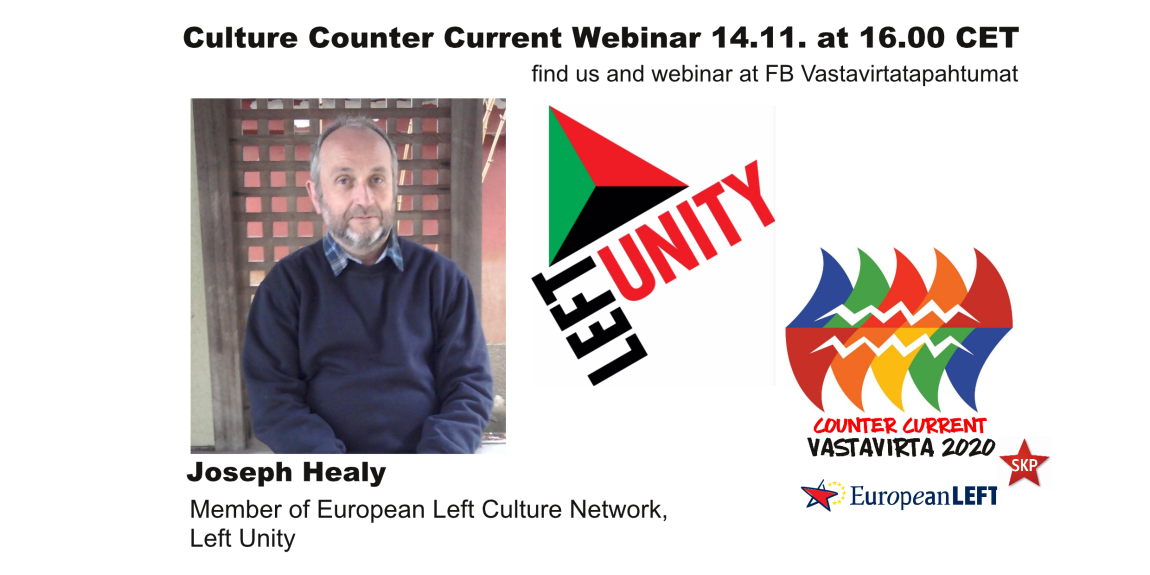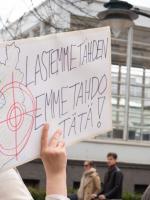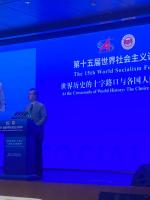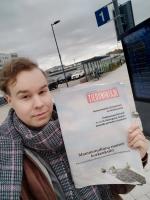Voimaa kulttuurista- Culture as Central Political Force
SCROLL DOWN FOR ENGLISH
Joseph Healy on yksi Kulttuurin Vastavirta verkkoseminaarin 14.11 puhujista klo 17.00 (Suomen aikaan). Kolme kulttuuri- ja taiteen asiantuntijaa ja aktivistia; Merikukka Kiviharju, Joseph Healy ja Mikaela Mansikkala avaavat verkkokeskustelussa kysymyksiä taiteesta, kulttuurista ja hyvinvoinnista.
Muusikko Meri-Sofia Lakos laulaa tilaisuudessa. Verkkokeskustelun puheenjohtaja on JP (Juha-Pekka) Väisänen.
Ison-Britannian Vasemmisto-puolueen Left Unity ja Euroopan vasemmiston kulttuuriverkoston jäsen Joseph Healy kirjoittaa runoja, on kulttuuri- ja taideaktivisti ja on esiintynyt Lontoon West End -teatterissa.
Valtava muutosmahdollisuus
Joillekin meistä on päivän selvää, että taide voi muuttaa maailmaa. Mutta onko se todella niin? Voiko taide muuttaa maailmaa?
Kun ihmiset kysyvät tätä, Josep Healyl kertoo, että hänellä on aina houkutus kertoa tarina oopperan esityksestä Ranskan vallankumouksesta, joka esitettiin Brysselissä vuonna 1830 ja joka herätti yleisöä niin paljon, että he menivät kaduille ja aloittivat sodan Belgian itsenäisyyttä hollantilaisia vastaan.
- Mutta ollakseni vakava, taiteella on valtavat mahdollisuudet muutokseen. Musiikilla, teatterilla, elokuvilla ja kirjallisuudella on kaikilla loistava filosofinen ja psykologinen voima. Ajatelkaa vaikka Dickensin romaaneja, joissa kuvataan ahneutta, epäoikeudenmukaisuutta, köyhyyttä ja rikollisuutta. Romaanit ovat johtaneet suuriin kampanjoihin viktoriaanisessa Englannissa. Ihmiset alkoivat vaatia muutosta. Dickens kuvaa sellaista pahuutta, jota edelleen löydämme omasta elämästämme ja kapitalistisista yhteiskunnista, sanoo Healy.
Healyn mukaan valtion, paikallisten kuntien ja kulttuurilaitosten tulee edistää taiteen saavutettavuutta.
- Suurin este taiteen saatavuudelle on yleensä köyhyys ja kustannukset. Valtio on järjestelmällisesti vetäytynyt (ainakin Yhdistyneessä kuningaskunnassa) taiteen tukemisesta jättäen sen markkinoiden tehtäväksi. Kapitalismi osaa hyödyntää taidetta ja tuotantoja ja tukee tuotantoja joilla on suuret yleisöt ja hyvät tuotot, sanoo Healy.
Sateenkaaren kulttuuria
Lontoossa korona on “antanut luvan” kiinteistöbisnekselle hyökätä HLBTQ kulttuuritiloihin. Moni vaihtoehtokulttuuritila on joutunut sulkemaan ovensa kaventuneen rahoituksen ja kiinteistöbisneksen takia.
- Sukupuoli ja seksuaalivähemmistöihin kohdistuneet viharikokset, erityisesti transfobia ovat lisääntyneet merkittävästi. Monille vähemmistöihin kuuluville omat tilat ovat olleet oman kulttuurin tekemisen erityisiä paikkoja. Omat tilat ovat olleet turvapaikkoja. Korona on estänyt tilojen pitämisen avoimena ja joitain tiloja uhkaa pysyvä sulkeminen. Monien HLBTQ-ryhmien taloudellinen toimeentulo on vaakalaudalla koska monet ryhmät ovat ns. vapaita ja järjestäytymättömiä ilman vakituisia tuloja, selittää Healy.
Vaihtoehtoinen eurooppalainen foorumi
Joseph Healy on Euroopan vasemmiston kulttuuriverkoston jäsen ja ollut mukana valmistelemassa vaihtoehtoisen eurooppalaisen foorumin 2020 kulttuuripoliittista ohjelmaa. Healy kutsuu kaikki sosiaalisesta muutoksesta kiinnostuneet osallistumaan verkkofoorumiin 8. – 28. Marraskuuta 2020.
Foorumi ja sen verkkotapahtumat yhdistävät edistyksellisiä, vasemmistolaisia ja vihreitä poliittisia voimia, ammattiliittoja, kansalaisjärjestöjä ja aktivisteja.
Kulttuuria koskeva verkkoseminaari pidetään 21. marraskuuta klo 17.00–20.00 (Keski-Euroopan aikaa). Tapahtuman otsikko on "Ei Eurooppaa ilman kulttuuria".
Tilaisuudessa keskustelevat mm. espanjalainen elokuvafestivaalien johtaja Jose Manuel Beltran ja kreikkalainen oopperalaulaja Margarita Syngeniotou
Joseph Healy avaa 14.11. Ajatuksia siitä mitä voimme odottaa Euroopan foorumin kulttuurikeskustelulta ja miksi kulttuuri- ja taideorganisaatioiden tulisi osallistua foorumin keskusteluihin. Lisäksi Healy puhuu Euroopan vasemmiston aloitteista liittyen taiteilijoiden, luovienalojen ja kulttuurityön tekijöiden, toimeentuloon ja hyvinvointiin.
Healy kertoo, että Eurooppalaisessa Foorumissa kulttuuri on ensimmäistä kertaa tasa-arvoisessa asemassa sellaisten aiheiden kanssa kuin nuoriso, naiset, ammattiliitot jne.
- Pidän välttämättömänä, että kulttuurikeskustelu eurooppalaisessa Foorumissa ei ole vain kaiken kokeneiden kulttuuripoliittisten puheiden pitäjiä, vaan enemmänkin niitä, jotka ovat itse oikeasti kulttuuririntamalla toimimassa ja töissä ja tuovat nyt kysymyksiä, joihin vasemmiston ja edistyksellisten joukkojen tulisi puuttua, korostaa Healy.
Yhteistyön vastavirtaa
Eri kansalaisyhteiskunnan järjestöt, aktivistit, taiteilijat ja yksittäiset toimijat yhdessä Demokraattisen sivistysliitto (DSL) Euroopan vasemmiston (EL), Suomen kommunistisen puolueen (SKP) ja Tiedonantaja-sanomalehden kanssa avaavat syksyllä ja talvella 2020 keskustelua ja vastavirtaista ajattelua rauhasta, kulttuurista ja ympäristöstä.
Tapahtumia on Suomessa ja seminaareihin voi osallista verkossa Vastavirtatapahtumat FB sivujen kautta
Vastavirta tarkoittaa edistyksellisiä aloitteita ja leikkauspolitiikan vastaisia paneelikeskusteluja. Vastavirta antaa äänen vaihtoehtoisille eurooppalaisille aloitteille rauhasta, kulttuurista ja ympäristöstä. Vastavirta haastaa nykyisen hegemonisen ajattelun, militarismin, kulttuurin ja taiteen kaupallisuuden sekä poliittisen eliitin välineet ilmastonmuutoksen torjumiseksi.
Vastavirta vahvistaa rauhanrakentamisen ääntä ja tuo esiin vaihtoehtoisia eurooppalaisia antimilitaristisia aloitteita sellaisen yhteiskunnan rakentamiseksi, jossa ei ole joukkotuhoaseita eikä sotia.
Vastavirta vahvistaa rasisminvastaisia aloitteita ja avaa keskustelua osallistuvasta demokratiasta sekä vahvistaa sellaisen yhteiskunnan rakentamista, jossa kansalaisten oikeudet ovat todellisia ihmisoikeuksia.
Vastavirta vahvistaa taiteilijoiden ja kulttuurityöntekijöiden ääntä sellaisen yhteiskunnan rakentamiseksi, jossa kulttuuri tehdään yhdessä ja se edistää kaikkien hyvinvointia.
Vastavirta -tapahtumat toimivat alustana kansalaisyhteiskunnan toimijoiden, järjestöjen, taiteilijoiden, intellektuellien uusille visioille. Vastavirta on Euroopan vasemmiston ja muiden eurooppalaisten edistyksellisten poliittisten voimien yhteistyöväline vaihtoehtojen rakentamiselle militarismille, kaupalliselle kulttuurille, ympäristökriisille ja kapitalismille.
Vastavirta-tapahtumat ovat avoimia foorumeita kansalaisyhteiskunnan eri toimijoille ja järjestöille, poliittisille järjestöille ja vasemmistolaisille, vihervasemmistolaisille, kommunistisille ja edistyksellisille puolueille, kansalaisjärjestöille, taiteilijoille ja kulttuurityöntekijöille, rauhanjärjestöille ja aktivisteille, ay-toimijoille, ihmisoikeusjärjestöille ja -aktivisteille, HLBTI- järjestöille ja aktivisteille.
Culture as Central Political Force
Activist and Member of European Left Culture Network Joseph Healy opens artists and activists daily struggle under Covid and poverty. Healy calls artists and cultural workers to recognize the importance of culture as a central political force.
Member of Left Unity party in UK and European Left Culture Network, Joseph Healy writes poems, is culture and art activist, has performed in a West End theatre in London.
Joseph Healy is one of the speakers of Culture Counter Current webinar on culture 14.11. from 16.00 (CET) where three cultural and artistic experts and activists; Merikukka Kiviharju, Joseph Healy and Mikaela Mansikkala discuss art, culture and well-being.
The online debate about art, culture and wellbeing also covers various European cultural policy initiatives and questions like the artists and cultural workers livelihood and income, the participation of civil society and various minorities.
Musician Meri-Sofia Lakos will sing at the event. The online discussion is chaired by JP (Juha-Pekka) Väisänen, conceptual artist and chairperson of the Communist Party of Finland
Political poems
One may wonder if all ideas are political. How do we recognize political poetry.
Joseph Healy thinks that it is easy to recognise political poetry. According to Healy political poetry can be very broad and can deal with a wide range of issues - racism, poverty, war, migration.
- An interesting example of this is the early 19th century poet Shelley who, when he was alive, was considered a threat to the system in Britain and wrote poems condemning the crushing oppression of the aristocratic government in Britain and calling on the masses of the early industrial revolution to rise up.
One of Shelley´s poems, The Mask of Anarchy, became famous again when Jeremy Corbyn used it at his huge outdoor rallies, particularly during the general election of 2017 where the lines "Ye are many they are few" became almost the catchphrase of the Corbynite movement and the attempt to move the Labour Party to the Left.
- I have recently written two poems for an online poetry reading with very different themes but both political. The first was about the health workers in the UK during the pandemic and the weekly ritual of people clapping outside their houses to support them every Thursday evening which lasted from April to June, says Healy
Healy´s poem was a very dark one and was called "Clapping for Carers". Healy uses satire to attack the empty government press conferences where all sorts of empty promises were made and he wrote how the health workers would be forgotten and betrayed by the government once the wave was over. According to Healy that was also what exactly happened.
- My second poem commemorated the Irish War of Independence, I am Irish, which happened a century ago and is considered the first crack in the breakup of the British Empire. I described a British soldier who was part of the special paramilitary forces sent to Ireland in 1920 to suppress the revolt and drew parallels with the other colonial struggles going on at the time. At the end of the poem, the soldier says that he will go to Palestine or Iraq after Ireland to join the colonial police, says Healy.
Tremendous potential for change
For some of us it is crystal clear that art can change world. But is it really so? Can art change the world?
When people ask this question Josep Healy is always tempted to tell the story of the performance of an opera about the French Revolution which as performed in Brussels in 1830 and which stirred up the audience so much that they went on to the streets and started the war of independence of Belgium against the Dutch.
- But to be serious, art has tremendous potential for change. Music, theatre, cinema and literature all carry terrific philosophical and psychological force. One needs only to think of the novels of Dickens with their portrayals of greed, injustice, poverty and crime which led to huge campaigns in Victorian England demanding change and which even today portray still the kinds of evils found in the grasping capitalist societies in which we live, says Healy.
According to Healy art should be made more accessible by the state, by local municipalities and by cultural institutions.
- The main barrier to accessing art is usually poverty and cost and the state has systematically withdrawn (at least in the UK) from subsidising art leaving it to the invisible hand of the market. Capitalism also commodifies art and performance leading often to a "bottoms on seats" dynamic which means that only those productions which are guaranteed a large audience and a good return are promoted, says Healy.
Art of the Rainbow
Joseph Healy is known as performer in London LGBTQ scene. The Covid 19 has also attack the LGBTQ community and its cultural work.
- I would not say that I am a well-known performer as I am not a professional but I did perform in a West End theatre several performances of the first ever musical about the lives of older LGBTQ people with a cast of older LGBTQ people and text based on our lived experience. I have also performed in LGBTQ cabaret usually satirising conservative attitudes and personalities, clarifies Healy
Covid has meant the loss of many LGBTQ performance spaces, although in London they are also under attack by property developers.
- There has been a significant rise in LGBTQ hate crime, particularly transphobia and for the embattled community many of these performance spaces have acted as a sanctuary. With lockdowns etc. it has often not been economical for these spaces to remain open and some are threatened with permanent closure. The economic fragility of many LGBTQ performance groups and with many of them being members of the precariat has meant that many have had no income whatsoever during this period threatening their future, explains Healy.
Digital future
Digital performance carries a wide range of meanings. These range from performances by prestigious cultural organisations such as national theatre and opera companies to small theatre and performance groups.
- It has been noticeable that, at least in the first wave lockdown, that several large institutions made their performances available free of charge on the web or allowed live streaming. Clearly this had a cost but it also demonstrated that it is possible to provide performances for free if there is sufficient funding and support. Many other cultural groups also made performances free and it opened up opportunities for many viewers who may not have been able to see them otherwise, says Healy.
According to Healy many disabled people who had problems attending meetings and performances because of both transport and access issues suddenly at the corona communication time found culture much more readily accessible.
- This has created a blueprint for how some performances can be disseminated in future but also raises questions about free and low-cost performance and how this could be utilised by smaller and more radical performance groups, says Healy.
Joseph Healy says that the pandemic has reinforced the battle for hegemony with the larger state funded organisations in a much stronger situation to weather the storm whereas many smaller more radical groups may disappear altogether being unable to access the audiences but also to pay for cultural workers who, always having been members of the precariat are now even more so.
Alternative European Forum
Joseph Healy is member of the European Left Cultural Network and has been involved in preparing the cultural policy agenda of the Alternative European Forum 2020. Healy invites anyone interested in social change to participate in the online forum from 8 to 28 November 2020.
The Forum and its online events are a unique way of bringing together progressive, leftist and green political forces, trade unions, NGOs and activists.
A webinar on culture will be held on 21 November from 17:00 to 20:00 (CET), with cultural policy in the center. The title of the event is "No Europe without Culture".
At the event, e.g. Spanish film festival director Jose Manuel Beltran and Greek opera singer Margarita Syngeniotou open debate on art, culture and Europe.
Joseph Healy will give us a hint in our Culture Counter Current webinar 14.11. what can we expect from the European Forum's cultural opening and why cultural and artistic organizations should take part in the Forum's discussions. In addition, Healy talks about the initiatives of the European left in relation to artists and creative actors, livelihoods and income.
According to Healy the Cultural Assembly at the European Forum is the first time that culture has taken an equal place with themes such as Youth, Women, Trade Unions etc at the European Forum and is a recognition of the importance of culture not just in itself but as a central political force for the Left and marginalised communities.
- I consider it vital that the Cultural Assembly is not just a gathering of crusty political warriors but also of those who are on the cultural frontline and raising the issues culturally which the Left and progressive forces should be addressing.
This is also an attempt to create a cultural manifesto for both the European Left and other progressive forces in Europe.
Themes to be addressed include: Is there a European culture? What is the role of migrants in European culture and what should culture be saying about migrants and the rise of Fascism in Europe? Is there an elite and a radical culture and how can the Left support radical culture in Europe?
Counter Current Collaboration
Different civil societies organizations (NGO`s), activists, artists and individual actors together with the Democratic Civic Association (DSL) European Left (EL), The Communist Party of Finland (SKP) and Tiedonantaja newspaper open progressive debate and Counter Current thinking on peace, culture and environment. Events take place in Finland and seminars take place in web.
Counter current means progressive Initiatives, panel discussions of anti-austerity policy – alternative European voices for peace, culture and environment. Counter Current challenges current hegemonical thinking, militarism, commercialism and political elites' tools to combat climate change.
Counter Current strengthens voices for peace building and alternative European antimilitary appeals for societies without weapons of mass destruction and wars. Counter Current strengthens voices for antiracist initiatives and participatory democracy for societies where citizen rights are real human rights. Counter Current strengthens voices of artists and cultural workers for societies where culture contributes to everybody's wellbeing, and is collectively created.
Counter Current event functions as platform for new visions of civil societies actors, organizations, artists, intellectuals. Counter Current is a tool of collaboration of future building forces in collaboration with European Left parties and other European progressive political forces for constructing alternatives for militarism, commercial creative industries, environmental crises and capitalism.




